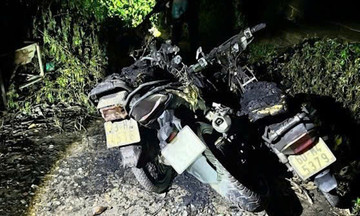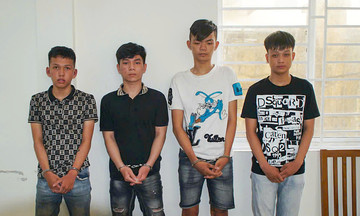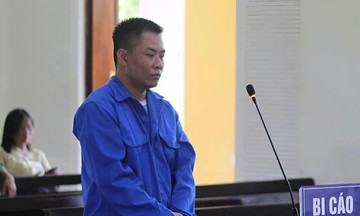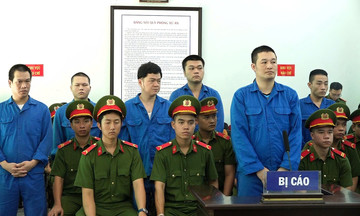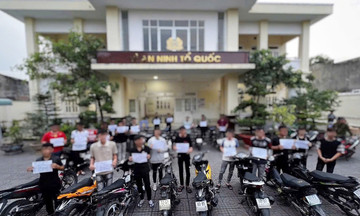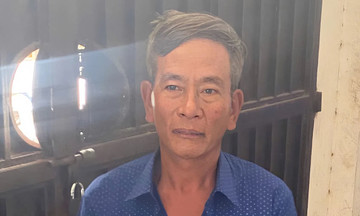On 16/7/2001, Ma Phuong village in Hengshan County, Shaanxi Province, suffered an unprecedented tragedy.
Ma Phuong was an obscure village on the Shaanxi plateau. In recent years, it had become known for the illegal production of explosives to supply nearby quarries. According to villagers, producing explosives was simple and highly profitable, leading many to participate, but this made the village a "powder keg."
The explosion occurred in the middle of the night. Yu Haizhan, a Ma Phuong resident, recounted that at past 3 a.m. on 16/7/2001, a deafening boom shook the village, throwing him from his bed.
Thirty minutes later, Yu was horrified to learn that six of his nephews and his older brother were buried under the rubble. His youngest son's friend, visiting Ma Phuong, was also killed. Yu survived because he was tending his melon field outside the village that night.
The epicenter, Ma The Quy's home, was transformed into a 36-meter-long, 27-meter-wide, and 7-meter-deep crater, rapidly filling with groundwater. Dozens of surrounding houses were flattened.
Half the village was destroyed. Windows shattered within a 5 km radius. The blast wave obliterated vegetation within a 1 km radius, killing and injuring countless livestock.
 |
The army conducts search and rescue operations in Ma Phuong after the explosion that destroyed half the village. Photo: Baike |
The army conducts search and rescue operations in Ma Phuong after the explosion that destroyed half the village. Photo: Baike
The explosion killed 83 villagers from 71 households and injured 98 others. It damaged 311 houses, causing over 5.6 million CNY in direct economic losses. Most of the dead were young people and children, as the elderly lived in cave dwellings on the hillside, away from the blast site; younger residents lived closer to the road, near Quy’s house.
Five families in Ma Phuong were entirely wiped out, including Quy’s. Four or five other families had only one survivor.
Ma Dondon lost eight relatives: his parents, wife, two children, brother, sister-in-law, and nephew. He survived because he was irrigating his fields on the night of 15/7. Yu Zisheng, 34, and his wife were injured but lost their three daughters and one son.
 |
Livestock killed by the explosion. Photo: Sohu |
Livestock killed by the explosion. Photo: Sohu
Alongside rescue and relief efforts, the Chinese Ministry of Public Security dispatched a team of over 20 investigators and technicians to determine the cause.
The investigation revealed that tens of tons of explosives, stored at the home of Ma The Quy by his brother Ma The Binh, 39, caused the blast. On 18/7, Binh confessed to illegally manufacturing and storing explosives.
To determine the nature of the incident, the Ministry of Public Security's task force, with expert analysis, ruled out accidental detonation, concluding it was a criminal act.
Interrogation revealed Ma Hongcheng, 51, as a prime suspect. Illiterate, he opened a quarry in 1995, also producing explosives, but his ventures continually failed. His explosive workshops, quarry, and chicken farm all closed, leaving him tens of thousands of CNY in debt. Due to his poor reputation, no one wanted to do business with him.
Ma Hongcheng had conflicts with Liu Shiwei, Ma The Binh, and other illegal explosives manufacturers. Before the incident, debt collectors hounded him, causing immense stress, erratic behavior, and threats of revenge.
On 2/8, police questioned Ma, but he only admitted to producing explosives. His daughter's diary, however, exposed his crime. She documented his unusual behavior, including drunken pronouncements like, "I'll blow everything up," and "If I can't get him, I'll blow him up too."
After further interrogation, Ma confessed.
On 16/8, the Yulin City Procuratorate, Shaanxi Province, indicted Ma. The indictment stated that his failing businesses and mounting debts led him to believe Liu Shiwei was responsible, prompting his deadly plan.
On 15/7, Ma retrieved two detonators and 14 meters of slow-burning fuse from his quarry in Yan'an City. Around 3 a.m. on 16/7, he went to Quy's house to steal explosives. Unable to remove the explosives through the wire-secured window, he improvised.
Overwhelmed by his 100,000 CNY debt and years of hardship, Ma thought, "What's the point of living? I might as well die!"
He poked a hole in a bag of explosives, inserted the lit fuse and detonator, and fled. At 3:25 a.m., over 30 tons of homemade ammonium nitrate explosives detonated.
The Yulin City Procuratorate charged Ma with reckless endangerment, causing serious harm to public safety, resulting in multiple deaths and significant damage.
 |
Ma Hongcheng was executed on the morning of 23/9/2001. Photo: Sohu |
Ma Hongcheng was executed on the morning of 23/9/2001. Photo: Sohu
Ma Hongcheng was sentenced to death and executed on the morning of 23/9/2001. Ma The Binh and an accomplice also received death sentences for illegally manufacturing and trafficking explosives.
The explosion shocked the nation, making Ma Phuong infamous overnight. For years, this agricultural village had developed an illegal explosives industry. Despite government crackdowns, the practice persisted. Some families scaled up production, selling to small coal mines across several regions. Increased scrutiny forced these operations underground, leading some to store explosives in their homes, culminating in the tragedy.
A preliminary investigation revealed that in April 2001, during a local safety inspection, Binh's illegal explosives workshop was shut down, but poorly secured, allowing him to move the remaining explosives to his brother's house in Ma Phuong.
On the afternoon of 18/7, the Hengshan County Public Security director was dismissed, detained, and investigated. The town police chief and deputy chief were also detained.
On 30/7, the Shaanxi provincial government acknowledged that while the explosion resulted from sabotage, it exposed serious bureaucratic issues within the government. Some local authorities had disregarded directives from the central and provincial governments, leading to lax safety enforcement.
The devastating explosion prompted the Shaanxi provincial government to implement corrective measures.
Tue Anh (Chinanews, Sina, Sohu)




